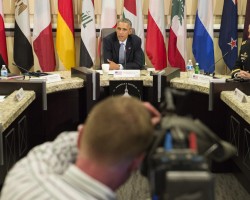
Why Limits in an ISIL AUMF are Necessary | Bill French
Why Limits in an ISIL AUMF are Necessary
By Bill French, NSN Policy Analyst
February 27, 2015 | The Hill
This week Congress begins considering an authorization for use of military force (AUMF) against the Islamic State. So far, the debate has focused on how specific a potential authorization should be. The administration has requested a modestly limited authorization and some in Congress want an even more tailored resolution. In response, conservative hawks in Congress are leading what amounts to a Blank Check Caucus that wants to grant this and future presidents broad war authority that is unspecific and unlimited so long as the Islamic State and vaguely related groups are the targets.
But the Blank Check Caucus misunderstands the basic functions of war authorizations and fails to appreciate the challenges that non-state actors like the Islamic State pose to Congress’ constitutional role to declare war. By correcting these errors, it is evident that limits are necessary and appropriate in an Islamic State AUMF.
The basic purpose of Congress having the power to grant war authority is to make sure the conflict is justified and assessed according to the national interest. The process of justifying and authorizing wars presumes that the actual conduct of the war will in a general sense conform to the terms in which it was authorized. This is not to say that Congress needs to know exactly how a war will transpire down to the smallest detail, but it is to say that the basic scope of the war needs to be defined. Without having a relatively clear, collectively shared sense of the basic scope of the conflict, it is not possible for Congress to weigh the costs and benefits of military action to inform its decision to authorize or not.
To continue reading, click here.




![Secretary Kerry, Energy Secretary Moniz Sit With Iranian Foreign Minister Zarif and Vice President of Iran for Atomic Energy Salehi Before Meeting in Switzerland. [State Department, 2/22/15]](/cms/assets/uploads/2015/02/Kerry-and-Zarif_2.22.15-140x140.jpg)
![Sen. Jim Inhofe wields a snowball on the Senate floor, February 26, 2015 [Screengrab from C-Span]](/cms/assets/uploads/2015/03/2.27.2015-Daily-Picture-140x140.png)